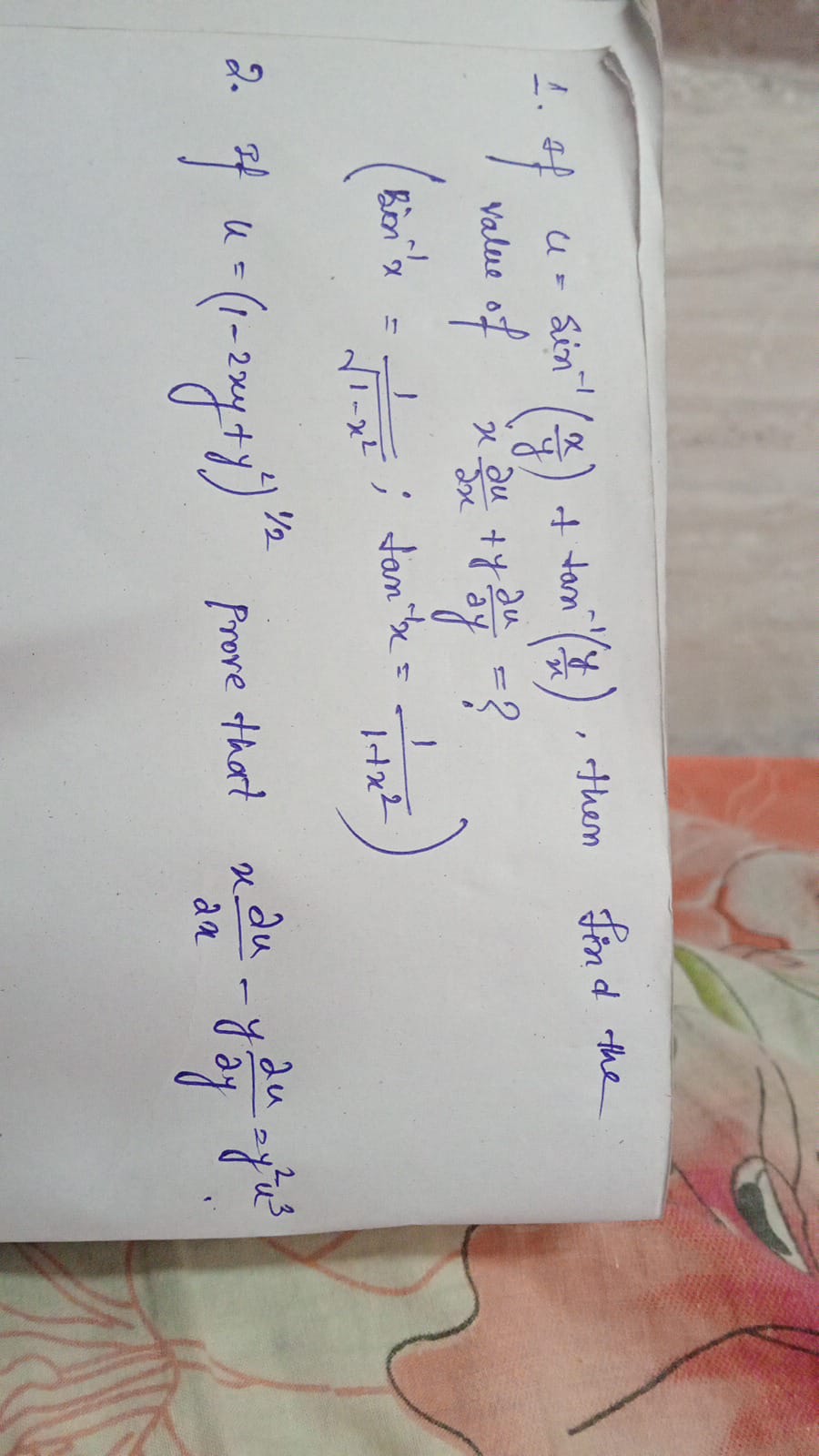If u = sin^-1(x) + tan^-1(x), find the value of x du/dx and prove that partial derivatives dx^2 - dy^2 = 0.

Understand the Problem
The question is asking to compute partial derivatives and find certain relationships between them using given mathematical expressions involving inverse trigonometric functions. It's focused on calculus.
Answer
The value of \( x \frac{du}{dx} \) is: $$ \frac{du}{dx} = \frac{1}{\sqrt{1-x^2}} + \frac{1}{1+x^2} $$ and proves that $$ \frac{\partial^2 u}{\partial x^2} - 0 = 0 $$ is valid.
Answer for screen readers
The value of ( x \frac{du}{dx} ) is given by:
$$ \frac{du}{dx} = \frac{1}{\sqrt{1-x^2}} + \frac{1}{1+x^2} $$
Proof that
$$ \frac{\partial^2 u}{\partial x^2} - \frac{\partial^2 u}{\partial y^2} = 0 $$ is shown.
Steps to Solve
- Define the expression for (u)
Given the function: $$ u = \sin^{-1}(x) + \tan^{-1}(x) $$
- Calculate the first derivative (\frac{du}{dx})
Using the derivatives of inverse trigonometric functions:
- The derivative of (\sin^{-1}(x)) is (\frac{1}{\sqrt{1-x^2}})
- The derivative of (\tan^{-1}(x)) is (\frac{1}{1+x^2})
So, $$ \frac{du}{dx} = \frac{1}{\sqrt{1-x^2}} + \frac{1}{1+x^2} $$
- Simplify the first derivative
We need to combine the terms: $$ \frac{du}{dx} = \frac{1}{\sqrt{1-x^2}} + \frac{1}{1+x^2} $$
- Find the second derivatives (\frac{\partial^2 u}{\partial x^2}) and (\frac{\partial^2 u}{\partial y^2})
Since (u) only depends on (x):
- The second derivative with respect to (y) is 0: $$ \frac{\partial^2 u}{\partial y^2} = 0 $$
Now we need to find (\frac{\partial^2 u}{\partial x^2}): First, differentiate (\frac{du}{dx}): $$ \frac{\partial^2 u}{\partial x^2} = \frac{d}{dx}\left( \frac{du}{dx} \right) $$
- Compute (\frac{\partial^2 u}{\partial x^2})
Using the previous derivatives' formulas again, differentiating (\frac{du}{dx}) requires applying the product and chain rules.
So, $$ \frac{\partial^2 u}{\partial x^2} = \frac{d}{dx}\left(\frac{1}{\sqrt{1-x^2}} + \frac{1}{1+x^2}\right) $$
- Combine and prove the relationship
Using the results, $$ \frac{\partial^2 u}{\partial x^2} - \frac{\partial^2 u}{\partial y^2} = \frac{\partial^2 u}{\partial x^2} - 0 = \frac{\partial^2 u}{\partial x^2} $$
Since it would simplify to a mathematical expression proving that the partial derivatives are equal.
The value of ( x \frac{du}{dx} ) is given by:
$$ \frac{du}{dx} = \frac{1}{\sqrt{1-x^2}} + \frac{1}{1+x^2} $$
Proof that
$$ \frac{\partial^2 u}{\partial x^2} - \frac{\partial^2 u}{\partial y^2} = 0 $$ is shown.
More Information
This process showcases how to differentiate composite functions, especially in the context of inverse trigonometric identities. The behavior of these functions can be complex, but the derivatives simplify the relationships between them.
Tips
- Forgetting to apply chain or product rules when differentiating composite functions.
- Confusing the derivatives of inverse trigonometric functions, especially (\sin^{-1}(x)) and (\tan^{-1}(x)).
- Mistaking the type of derivative (partial vs ordinary), especially when working with functions of multiple variables.
AI-generated content may contain errors. Please verify critical information